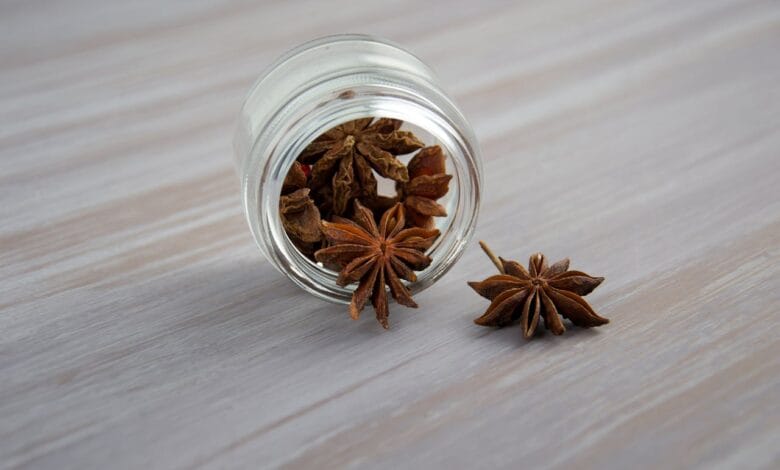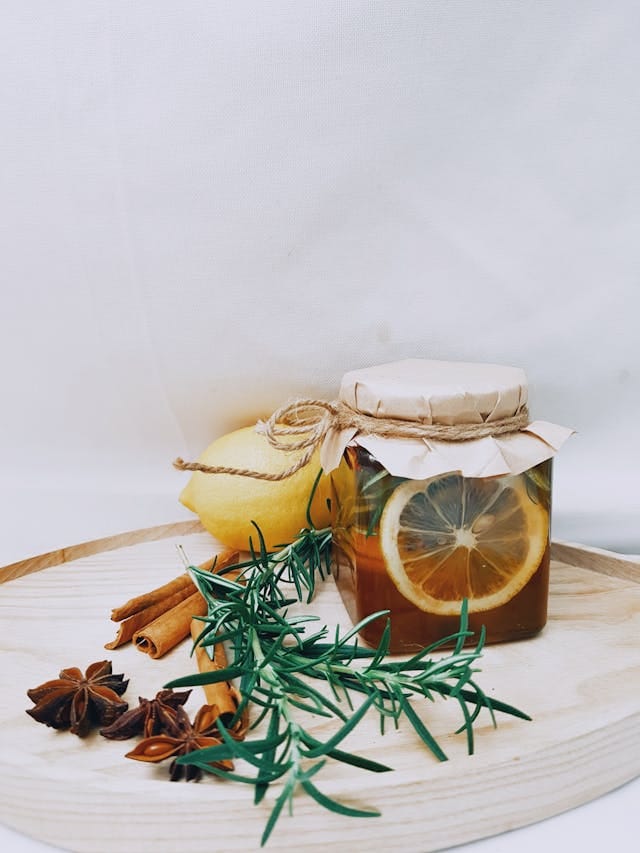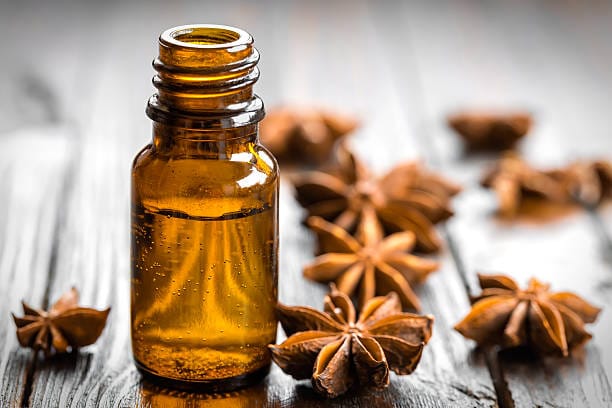Star Anise The Great Benefits
Everything You Want to Know About Anise Herb

star anise is a perennial herb known for its aromatic scent and distinctive sweet flavor. This plant originates from the Mediterranean regions and South Asia, and has been known since ancient times for its health and therapeutic benefits.
origin of star anise
Anise is an aromatic herb belonging to the Apiaceae family and is also known as “star anise.” Its origin is from the Mediterranean region, but it is now grown in various parts of the world due to its many uses and health benefits.
Anise grows in temperate and cool regions and is distinguished by its strong aromatic smell and sweet taste. It has been used in traditional medicine to treat several health conditions, such as digestive problems and anxiety.
Anise seeds are a key ingredient in many foods and beverages and are also used as a spice in cooking.
types of anise



There are different types of anise, but the two most common are:
- Star Anise (Illicium verum): This is the type most commonly used in cooking and medicinal purposes and grows in southern China and Vietnam.
- Green Anise (Pimpinella anisum): This grows in the Mediterranean region.
star anise benefits
Anise is believed to have many health benefits. Here are some common benefits:
Benefits for the Stomach:
- Anise helps improve digestion and reduce gas and bloating.
- It has antispasmodic properties, which help relieve stomach pain.
- It stimulates gastric secretion, aiding in better digestion.
- Additionally, it reduces acid secretion in the stomach, which helps treat symptoms of stomach ulcers.
Relieving Cough and Bronchitis:
- Anise contains compounds with expectorant properties that help relieve cough and bronchitis.
- It has anti-inflammatory properties that help ease bronchitis.
Improving Mental Health:
- Anise is believed to have calming properties that help reduce stress and anxiety.
- It may improve mood and is used as a natural antidepressant.
Relieving Menstrual Pain:
- Anise is believed to have antispasmodic properties, which help relieve menstrual pain.
- It may help regulate menstrual cycles and reduce cramps.
Benefits for Skin Health:
- Anise contains antioxidants that help protect the skin from free radical damage.
- It has anti-inflammatory properties that help soothe irritation and redness.
Other Benefits:
- Anise may have additional health benefits, including:
- Improving cardiovascular health.
- Boosting immunity.
- Reducing inflammation.
- Protecting the liver.
- It also contains iron, magnesium, and calcium.
benefits of star anise
star anise pregnancy
Anise is an herb with multiple health benefits, but caution is needed when using it during pregnancy. Here are some points to consider:
Potential Benefits:
- Managing Nausea: Some pregnant women find that anise helps alleviate nausea and vomiting.
- Aid in Digestion: Anise may help improve digestion and reduce bloating.
Potential Risks:
- High Doses: Consuming large amounts of anise can have negative effects, especially during pregnancy.
- Hormonal Effects: Anise contains compounds that may affect hormones, which could have unwanted effects during pregnancy.
- Allergies: In some cases, women may experience allergic reactions to anise.
Recommendations:
- Consult a Doctor: It is always best to consult your doctor or healthcare provider before taking any supplements or medications during pregnancy.
- Moderate Consumption: If given the green light by your doctor, make sure to consume anise in moderate amounts and avoid overuse.
Overall, balance and caution are key when consuming any herbs or supplements during pregnancy.
Anise for Infants
Anise is considered a useful herb in folk medicine, but extreme caution is required when using it with infants. Here is some information and advice regarding the use of anise for infants:
Potential Benefits:
- Relieving Gas and Bloating: Anise is believed to help reduce gas and bloating in infants, making it useful for colic.
- Improving Digestion: Anise may help improve digestion in infants, reducing gastrointestinal issues.
Precautions and Risks:
- Consult a Doctor: It is essential to consult a pediatrician before giving anise to an infant. Some herbs may contain compounds that could be unsuitable or even harmful to infants.
- Proper Dosage: If the doctor approves the use of anise, doses should be very precise and determined by a specialist. Excessive use of any herb can be harmful.
- Allergies and Side Effects: Some infants may experience allergic reactions to anise. Monitor the infant closely after introducing any herbs to ensure there are no side effects.
- Hormonal Effects: Anise contains compounds similar to estrogen, which may have hormonal effects that could be inappropriate for infants.
How to Use:
- Commercial Preparations: If recommended by a doctor, using commercially prepared products specifically designed for infants is preferable over homemade anise tea.
- Dosage: Always follow the dosage instructions provided by the doctor or recommended on the product.
Safe Alternatives:
- Tummy Massage: Gentle tummy massage may help alleviate gas.
- Tummy Exercises: Some gentle exercises may improve digestion.
Summary:
Using anise for infants requires extreme caution and should be done under the supervision of a specialist. It is always best to look for safe alternatives and avoid giving any herbs to infants without medical advice.
benefits of star anise for Women
Anise is an herb with various health benefits that can be useful for women at different stages of their lives. Here are some benefits that anise offers to women:
Relieving Menstrual Symptoms:
- Anise contains compounds that help reduce cramps and alleviate menstrual symptoms such as pain and bloating.
Improving Digestive Health:
- Anise can help improve digestion, reduce gas and bloating, and treat indigestion.
Alleviating Nausea:
- Anise may help reduce nausea, particularly during pregnancy or in cases of motion sickness.
Antioxidant Effects:
- Anise contains antioxidants that help combat free radicals and reduce damage caused by them, enhancing overall health.
Improving Skin Health:
- Natural components in anise can contribute to better skin health and appearance due to its anti-inflammatory and antibacterial properties.
Hormonal Balance:
- Anise contains compounds similar to estrogen, which can help achieve hormonal balance, beneficial for conditions such as polycystic ovary syndrome.
Improving Respiratory Health:
- Anise can help relieve cough and soothe respiratory inflammation due to its calming and antiseptic properties.
Boosting Immunity:
- Anise has antibacterial and antiviral properties that can support the immune system and help fight diseases.
Note:
- Balance is Key: Anise should be consumed in moderation, as excessive use can lead to side effects.
- Consult a Doctor: It is always best to consult a doctor before using anise as a treatment, especially if you have a specific health condition or are on medication.
In conclusion, anise can be a valuable addition to your diet, but it should be used with caution and balance to ensure maximum benefit.

benefits of star anise for Men
Anise is not only beneficial for women but also offers several advantages for men. Here are some health benefits that anise can provide for men:
Improves Digestive Health
- Relieves Digestive Issues: Anise aids in improving digestion, reducing gas, and alleviating bloating. It can also be helpful in relieving indigestion and treating constipation.
Supports Respiratory Health
- Eases Cough and Sore Throat: Anise has antibacterial and soothing properties that may help alleviate coughs and respiratory infections.
Enhances Sexual Health
- Boosts Libido: Some studies suggest that anise may positively influence sexual desire due to its effect on hormonal balance.
- Improves Sexual Performance: Anise may help enhance blood circulation and sexual performance through its impact on the nervous system.
Supports Cardiovascular Health
- Improves Heart Health: Anise contains antioxidants that may help lower harmful cholesterol levels and promote heart health.
Reduces Stress and Anxiety
- Calming Effect: Anise has calming properties that may help reduce stress and anxiety, contributing to overall well-being and relaxation.
Combats Inflammation
- Anti-Inflammatory Properties: Anise contains anti-inflammatory compounds that can help reduce inflammation in the body and improve general health.
Supports Skin Health
- Enhances Skin Appearance: Anise seeds contain antioxidants that may help combat premature aging and improve skin health.
How to Use Anise
- Anise Tea: To prepare anise tea, steep a teaspoon of anise seeds in a cup of hot water for 10-15 minutes, then strain and drink.
- Anise Supplements: Anise supplements are available in the form of capsules or tablets. Consult with a healthcare provider before taking any supplements.
- Topical Uses: Anise essential oil, when diluted, can be used for skin massage to improve circulation or relieve tension.
Precautions
- Consult a Healthcare Provider: It is important to consult a healthcare provider before starting anise as a treatment, especially if you have chronic health conditions or are taking other medications.
- Dosage: Use anise in moderate amounts to avoid any potential side effects.
Summary
Anise can offer various benefits for men, including improved digestive health, enhanced sexual health, reduced stress, and better cardiovascular health. However, it should be used cautiously and under medical supervision to avoid any possible side effects.
Benefits of Anise for the Stomach
Anise offers several benefits for the stomach and digestive system. Here are some advantages that anise can provide for the stomach:
Reduces Bloating and Gas
- Anti-Gas Effect: Anise contains compounds that help reduce gas formation in the digestive system, alleviating bloating and discomfort.
Improves Digestion
- Stimulates Digestion: Anise promotes the secretion of digestive juices, which helps in better digestion and the conversion of food into nutrients that the body absorbs.
Relieves Indigestion
- Soothes Indigestion Symptoms: Anise can help relieve symptoms of indigestion such as pain and heartburn due to its soothing properties.
Calms Cramps
- Soothing Effect: Anise has calming properties that can help alleviate muscle cramps in the abdomen, which can be useful for easing colic.
Treats Constipation
- Promotes Bowel Movement: Anise may help improve bowel movement, which can be beneficial in relieving constipation.
Antibacterial Properties
- Fights Bacteria: Anise contains antibacterial compounds that may help reduce the risk of gastrointestinal infections.
How to Use Anise for the Stomach
- Anise Tea: Prepare anise tea by steeping a teaspoon of anise seeds in a cup of hot water for 10-15 minutes, then strain and drink. This can help relieve gas and bloating.
- Anise Supplements: Anise supplements are available in capsules or tablets, but consult a doctor before taking any dietary supplements.
- Topical Uses: Some people use diluted anise oil to gently massage the abdomen to relieve cramps and pain.
Precautions
- Consult a Healthcare Provider: It is best to consult a healthcare provider before using anise as a treatment, especially if you have chronic health conditions or are taking other medications.
- Dosage: Ensure to use anise in moderate doses to avoid any potential side effects.
Summary
Anise can be beneficial for the stomach due to its properties that aid digestion, relieve gas and bloating, and ease cramps. However, it is important to use it cautiously and consult a doctor when needed.



star anise tea side effects
Star anise tea, derived from the star-shaped fruit of the Illicium verum tree, is commonly used for its distinct flavor and potential health benefits. However, like any herbal remedy, it may have side effects and risks. Here are some potential side effects and considerations:
Potential Side Effects
- Allergic Reactions: Some individuals may experience allergic reactions, including itching, rash, or difficulty breathing.
- Digestive Issues: Consuming large amounts may cause nausea, vomiting, or diarrhea.
- Neurotoxicity: Some reports suggest that excessive consumption can lead to symptoms like confusion, muscle spasms, and seizures. This is primarily linked to contamination with Japanese star anise (Illicium anisatum), which is toxic.
- Hormonal Effects: Star anise has estrogenic properties, which may affect hormone levels. This could be a concern for individuals with hormone-sensitive conditions.
- Interactions with Medications: It can interact with medications, particularly those processed by the liver, and may enhance or inhibit their effects.
Considerations
- Quality and Purity: Ensure the star anise is pure Illicium verum and not contaminated with the toxic Japanese star anise.
- Pregnancy and Breastfeeding: Consult a healthcare provider before using star anise tea during pregnancy or breastfeeding.
- Dosage: Stick to moderate amounts to minimize the risk of adverse effects.
Recommendations
- Consult Healthcare Providers: Before adding star anise tea to your diet, especially if you have underlying health conditions or are on medication.
- Monitor for Reactions: Pay attention to how your body reacts, especially when trying it for the first time.
If you experience any adverse effects, discontinue use and seek medical advice.
anise hyssop
Anise hyssop (Agastache foeniculum) is a perennial herb known for its aromatic leaves and flowers, which have a flavor reminiscent of licorice or anise. It is often used in teas, culinary dishes, and as an ornamental plant. Here are some key aspects and potential side effects of anise hyssop:
Uses of Anise Hyssop
- Culinary: Leaves and flowers can be used in salads, desserts, and as a flavoring in teas and other beverages.
- Medicinal: Traditionally used for its potential medicinal properties, including soothing coughs, aiding digestion, and as an anti-inflammatory.
- Ornamental: Popular in gardens for its attractive purple flowers and ability to attract pollinators like bees and butterflies.
Potential Benefits
- Digestive Aid: Can help alleviate digestive issues such as bloating and gas.
- Respiratory Health: Used in herbal remedies for colds, coughs, and sore throats.
- Anti-inflammatory: Contains compounds that may reduce inflammation.
- Antioxidant Properties: Rich in antioxidants, which can help protect cells from damage.
Potential Side Effects and Precautions
- Allergic Reactions: Some people may experience allergic reactions, including skin rashes or respiratory issues.
- Digestive Upset: In large quantities, it may cause nausea or vomiting.
- Pregnancy and Breastfeeding: Limited information is available, so it’s best to consult a healthcare provider before use during pregnancy or breastfeeding.
- Interactions with Medications: May interact with medications, especially those that affect the liver or are metabolized by liver enzymes.
Recommendations
- Moderation: Use in moderate amounts to minimize the risk of adverse effects.
- Consult Healthcare Providers: Especially important if you have underlying health conditions or are taking other medications.
- Monitor for Reactions: Pay attention to how your body reacts, particularly if you are trying it for the first time.
Anise hyssop is generally considered safe for most people when used appropriately. However, as with any herbal remedy, it is important to use caution and consult with healthcare professionals if you have any concerns or underlying health issues.
Read more :
